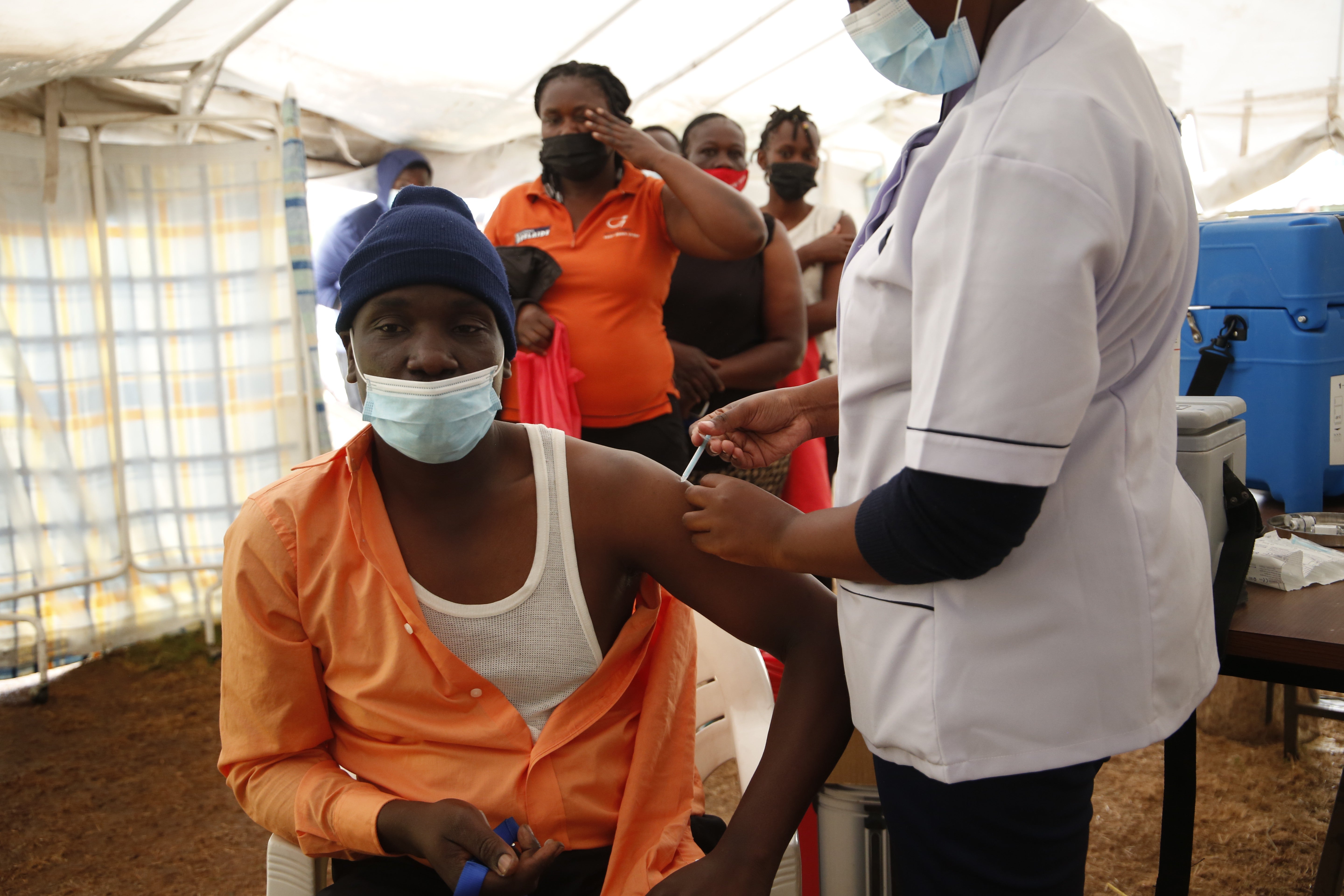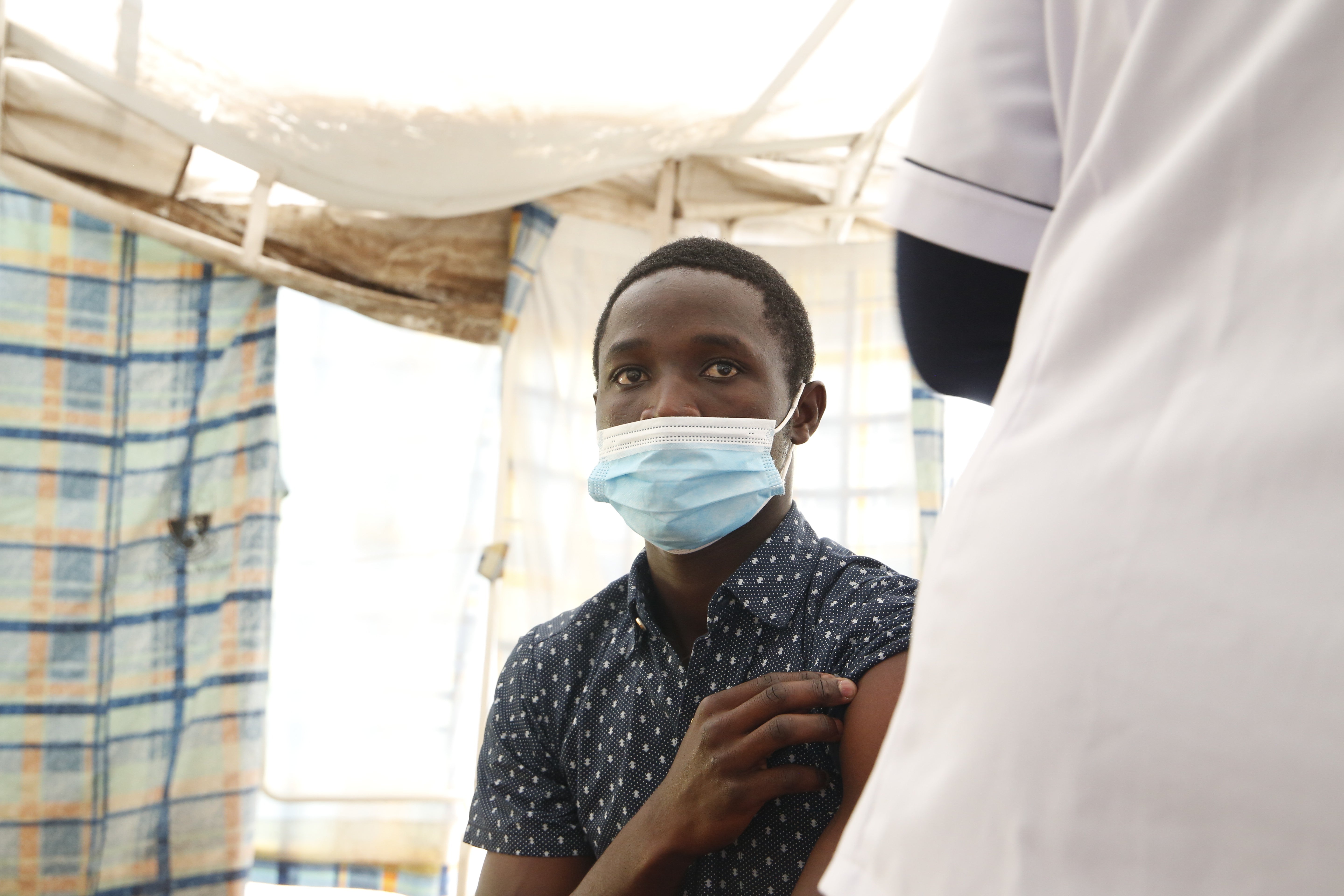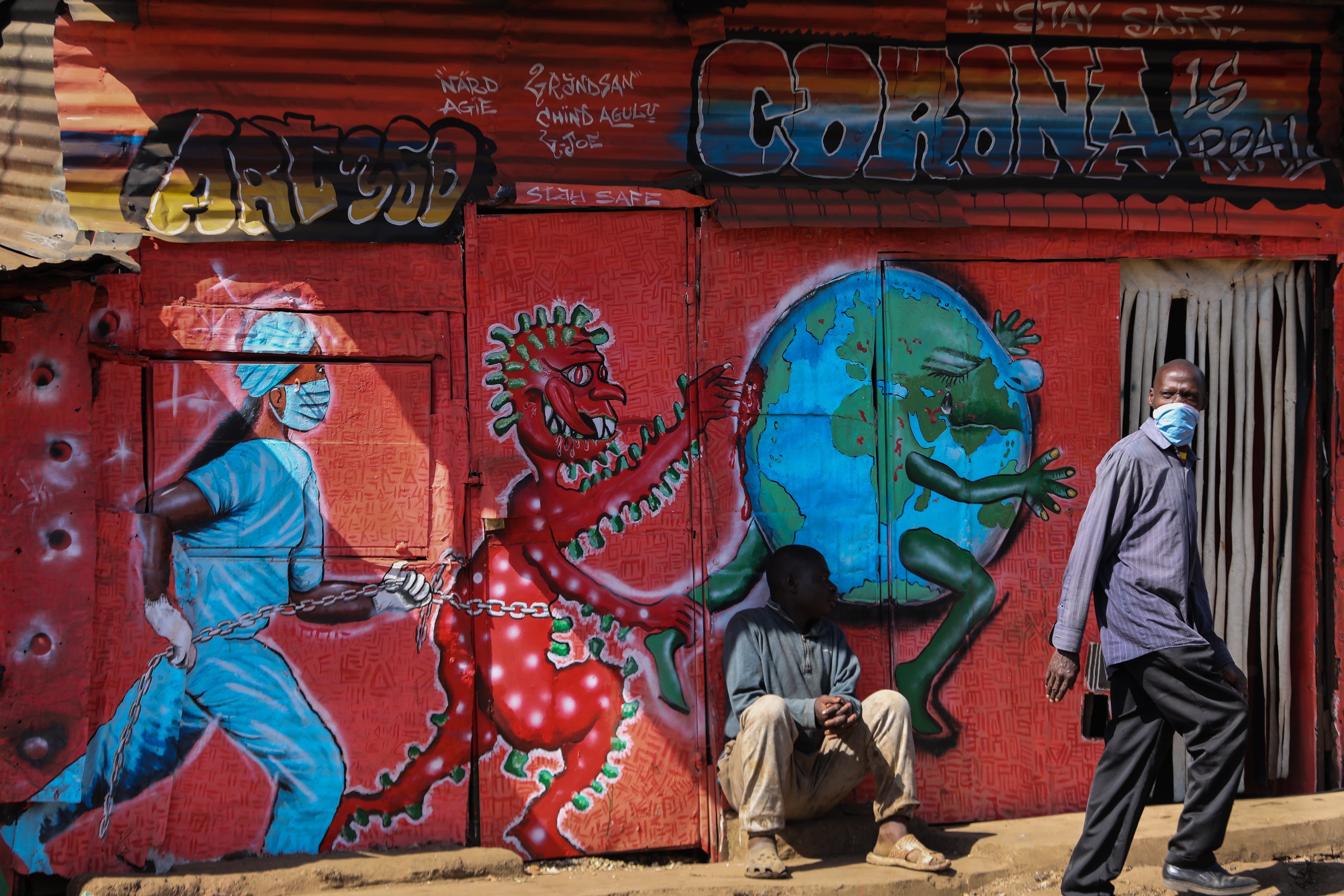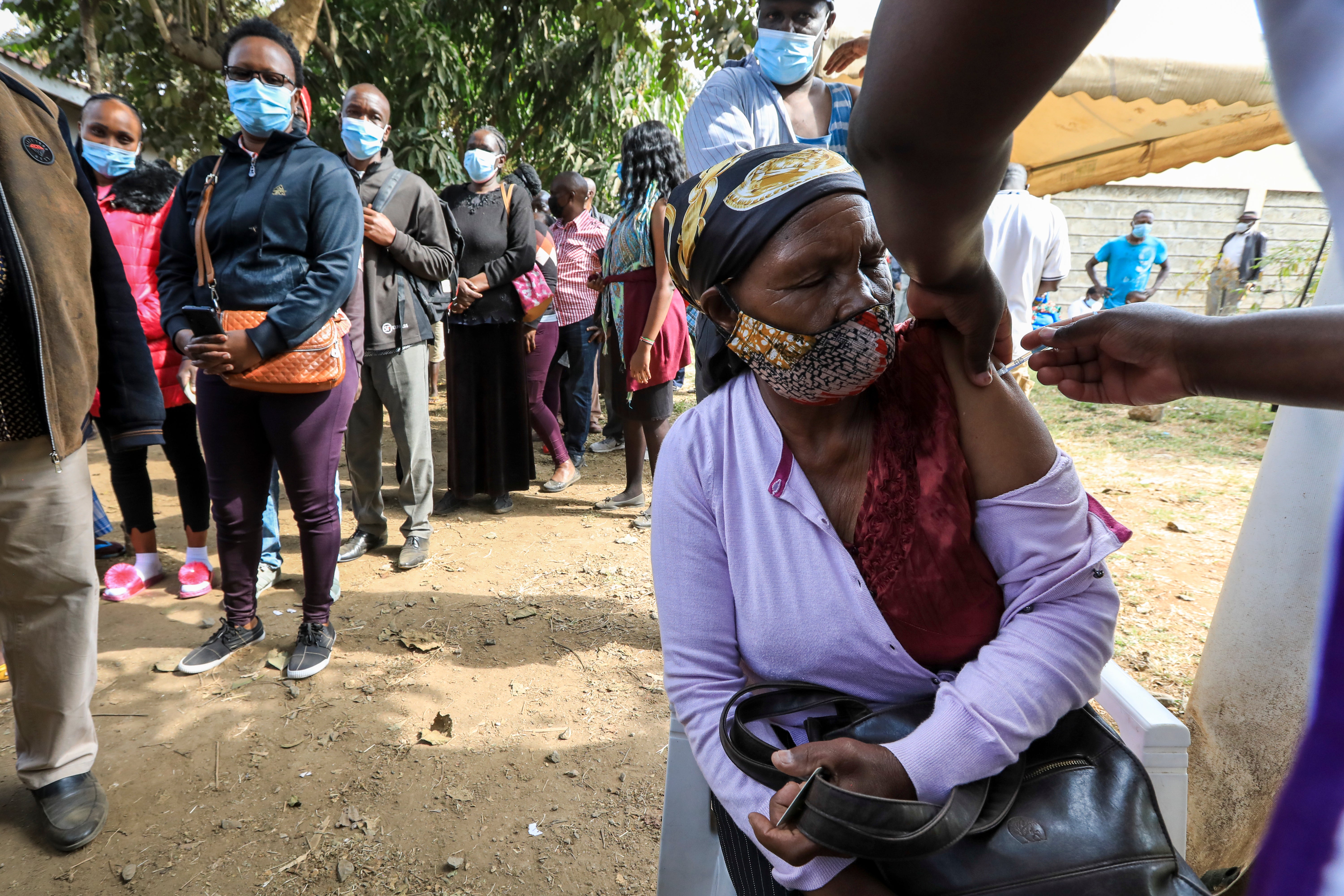Race against time: Kenya’s vaccine drive stutters as curbs loom for millions of unjabbed
With so few Kenyans double vaccinated, the fairness of imposing wide-ranging restrictions has been called into question, writes Anthony Langat in Nairobi

Sitting in a tent at Nairobi’s oldest hospital, 21-year-old medicine student Austin Odiwuor waited for his first coronavirus vaccine, part of an ambitious Kenyan campaign to ensure 10 million people are jabbed by the end of the year.
Odiwuor, who recently returned to the capital to start a new semester after spending two months at home while universities were closed due to the pandemic, said he felt fortunate to finally be receiving the vaccine.
“I have been away in my rural home and I couldn’t get the vaccine at the local dispensary,” said Odiwuor, who hails from Kenya’s southern Nyanza region.
“(There), you go to the facility and they keep rescheduling you,” he told The Independent at the end of November.
Once Odiwuor got back to Nairobi last month, he simply registered online, booked an appointment, and turned up at the Kenyatta National Hospital to get the Moderna vaccine after a brief wait.
Officials are hoping that millions more Kenyans follow Odiwuor’s example in the coming weeks, and have issued a stark warning to those who do not. The health ministry last month said citizens who are not fully vaccinated would not be able to use public transport, go to bars and restaurants, or access government services from 21 December.
The directive has drawn criticism from lawmakers and activists who say it is draconian and will leave millions of Kenyans unable to work or study, just months after a year-and-a-half long curfew was lifted.
However, others, including health experts, say the deadline is a necessary last-ditch tactic to boost uptake of the jab in a country where vaccine hesitancy is widespread, and its availability is patchy.
One’s right to health cannot be curbed by someone who makes a personal choice to not get vaccinated
Kenya, which has recorded about 256,000 Covid cases and 5,330 deaths, is far from alone in this regard.
Countries across sub-Saharan Africa – where the vaccination rate is about 5 per cent – have been hindered by global inequities in vaccine stocks while governments have struggled to persuade people to get jabbed.
The emergence of the new omicron variant – which was first discovered in South Africa last month – has spurred calls for vaccines to be delivered more quickly, both to keep people healthy and slow the spread of a strain which is feared to be more transmissible and better able to evade immunity.
In Kenya, about 4.2 million of the country’s 54 million population had received a single dose and 2.6 million had been double jabbed before the country began a 10-day mass inoculation campaign on 26 November.
After the drive ended on 6 December, government data showed those figures had risen to nearly 4.7 million and 3 million respectively. This means about one in nine adults in Kenya is now fully vaccinated.

Whether or not the overall 10 million target ends up being met, concerns are being raised about the 24 million or so adults who have not been double jabbed and the fairness of curtailing their personal freedom and putting their livelihoods at risk in a matter of weeks.
Amnesty International last month said the directive turns an “important voluntary exercise into a coercive exercise”.
Koigi Wa Wamwere, a social commentator and former lawmaker in Nakuru county, said the government should be “taken to ask” if people were wanting to get vaccinated but supplies were lacking.
“This virus should be treated as a societal responsibility and it is wrong for the government to say that we will not give you services if you have not been vaccinated,” he told The Independent.
Dr Stephen Muleshe, a member of Kenya’s Covid vaccination taskforce, said that the vaccine drive had been slow and “hit by financial hitches”.
However, he dismissed concerns about insufficient stocks and said the country had “vaccines in the pipeline” that would be arriving every month.
Kenya has received about 20.7 million vaccines, mainly through the global Covax initiative that aims to deliver doses to the world’s poorest populations or directly from donors including Germany.
“We are sure that no one will go to the (vaccination) centre and miss out,” said Dr Muleshe.
But the reality is not so simple – especially outside of Nairobi.
While at least a quarter of adults in the Nairobi area are fully jabbed, that proportion drops to less than 5 per cent in 15 of Kenya’s 47 counties.
Dr Ronnie Kibet, who oversees Covid vaccinations in Bomet county in Kenya’s South Rift region, said that logistics was as much an issue if not more so than supplies.
In Bomet county, which has a population of about 875,000, there are 160 health facilities in total – from medicine dispensary through to hospitals – of which about a quarter can administer inoculations, and only five are able to store the vaccine.
“Health workers have to come and collect them in the morning, do the outreach and bring back the remnants in the evening, then come again the next day,” said Dr Kibet.
The county has access to a meagre 3,000 doses every three months and while officials can also request more, it depends on the availability at a regional depot nearly 200km away.
Dr Kibet must also contend with myths and misconceptions around the vaccine.

Rumours abound within communities and on social media; some say the jab causes blood clots, impotence or infertility, and even death.
A survey of 400 Kenyans earlier this year by GeoPoll found that only 42 per cent believed they had been provided with enough trustworthy information about the Covid vaccine.
Furthermore, the proportion of respondents who said they would be likely to get the vaccine in the near term dropped from two-thirds in November 2020 to just over half in April this year.
But in Bomet, uptake has been improving since Dr Kibet and his team started reaching out to people in villages to convince them of the merits of being jabbed.
“We changed our approach from just waiting at the facility to going out there to look for people,” he added.
Yet such an approach is not replicable in more densely populated areas such as the informal settlement of Kibera, located in Nairobi just a few miles south of Kenyatta National Hospital.
Home to about 250,000 people, residents of the informal settlement are particularly vulnerable to Covid due to their close proximity to one another, the lack of proper infrastructure, and limited healthcare, not to mention worsening poverty.
Mary Akinyi, a 22-year-old college student, refuses to get the vaccine because she is afraid of possible side effects that she heard about on social media and from her neighbours.
“I have heard that one gets headaches, fatigue and even cancer if they are vaccinated,” she said, adding that no one in her family is getting jabbed.
Akinyi does not believe the government will go through with its 21 December deadline – perhaps unsurprising in a slum that has often felt neglected by the powers that be.
“Just like other directives in the past, this will not be implemented,” she added.
This lack of trust in the authorities is not surprising.

Earlier this year, the government allowed politicians and even foreign diplomats to be vaccinated before vulnerable citizens, while there have been reports of people being allowed to skip queues for bribes as high as $100, which average Kenyans cannot afford.
Dr Evelyn Gitau, director of research at the African Population and Health Research Center – a Nairobi think tank – said she did not believe that the 10 million target would be met by the end of the month, pointing to issues with the online registration system and inconsistent supplies.
Nonetheless, she said vaccinating as many people as quickly as possible was imperative to prevent deaths and protect an “already overburdened acute health care system from crumbling”.
“(One’s) right to health cannot be curbed by someone who makes a personal choice to not get vaccinated,” she said.
Back at Kenyatta National Hospital, Austin Odiwuor was worried about the timeline for receiving his second jab.
“They haven’t told me when exactly I should get the second dose,” he said. “I have heard that one can avail themselves for the second dose and not receive it.”






Join our commenting forum
Join thought-provoking conversations, follow other Independent readers and see their replies
0Comments